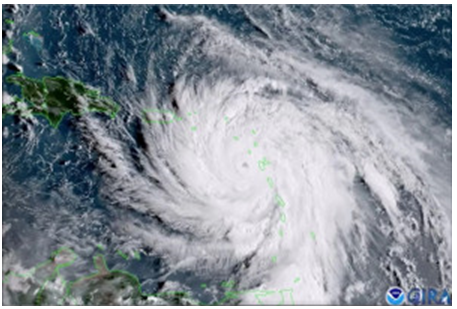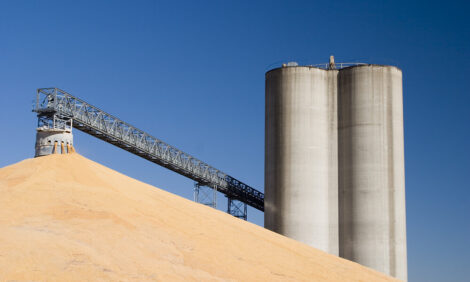



Influence Feed: Tracking influential issues in Food and Agriculture
The Zoetis Influence Feed is a fortnightly subscription newsletter informing you of the latest trends in the Food and Agriculture Industry.
Top 5 influencer topics September 18 - October 1
1 Hurricanes:
Hurricane Maria made landfall in Puerto Rico on Sept. 20, with maximum wind speeds of 155 mph (Reuters). New York Times covered the damage, which the Puerto Rico Department of Agriculture estimates pinned at $780 million, an 80% loss of the U.S. territory’s agricultural yield. Citing similar devastation for trade partners in the Caribbean, New Food Economy asked “How will Puerto Rico feed itself?” The concerns prompted José Andrés and other celebrity chefs to aid in relief efforts and provide food service for hospitals on the island (Eater).
Additionally, farmers and other business owners continue to assess the aftermath of hurricanes Harvey and Irma. Bloomberg’s Alan Bjerga analyzed crop insurance coverage and shortfalls. Buzzfeed’s Venessa Wong highlighted Hurricane Irma’s impact on Florida citrus growers. Activist group Food & Water Watch warned that flooding from storms like Hurricane Harvey cause breaches in manure lagoons. Politico Morning Agriculture pointed out a silver lining: “The recent spate of hurricanes may have increased public awareness of the government’s approach to disaster relief.”
2 Organic Oversight:
On Sept. 18, the USDA Office of the Inspector General published (PDF) a report on imports of organic foods, finding “The lack of controls at U.S. ports of entry increases the risk that nonorganic products may be imported as organic into the United States and could create an unfair economic environment for U.S. organic producers.”
Organic Trade Association’s Gwendolyn Wyard told Civil Eats, “There’s nothing like fraud to put concern and distress in the minds of consumers. … None of the organic programs are in the baseline [of the Farm Bill], so we absolutely have to defend any small amount of money we can get.”
Politico Morning Agriculture noted a shift away from the government for those in the organic sector; a J.M. Smucker Company spokesperson said, “It’s all up to us for making sure we are reliable and accountable for what we are selling. We can’t count on the government.”
3 Dicamba:
Dicamba is a herbicide that works effectively on soybean and cotton plants designed to withstand it but can be problematic when it drifts onto crops that do not use those seeds. Dan Charles of NPR: The Salt explained, “The issue has driven a wedge through farming communities in the Midwest, straining friendships and turning neighbors into adversaries.”
The Arkansas State Plant Board, which initiated a ban for this past summer, agreed (PDF) on Sept. 21 to ban the use of dicamba from April to November 2018. The governor will have the opportunity to sign off on the ban after a Nov. 8 public hearing (PDF).
American Soybean Association President Ron Moore offered, “We are committed to establishing both a cause and a path forward on the dicamba issue, including what actions need to be taken to assure that soybean farmers can use the product safely without damaging their own or their neighbors’ crops.”
4 Food Delivery:
Food delivery — not just restaurant meals but also groceries and meal kits — drew substantial buzz this reporting period, with several factors contributing:
- Eater reported on Sept. 18 that restaurants are building more of their business strategy around delivery.
- On Sept. 20, Albertsons Companies purchased meal kit company Plated. Plated co-founder and CEO Josh Hix remarked: “As meal kits continue to gain traction in the marketplace, we believe the winning formula combines choice, flexibility, culinary expertise and the ability for customers to buy across channels.”
- On Sept. 22, Wal-Mart Stores, Inc. announced that it is testing delivery of groceries directly to customers’ refrigerators and pantries.
- In an interview with FoodNavigator-USA, Andy Levitt — CEO of meal kit company Purple Carrot — explained that “The Amazon Whole Foods deal created a real sense of urgency among strategics … brands are seeking out their dance partner before the music stops.”
- Amazon Inc. partnered with online ordering company Olo on Sept. 22 to expand its Amazon Restaurants delivery service. Food trend magazines, such as Grub Street, cheered the potential delivery of food from Shake Shack and Chipotle Mexican Grill, Inc.
- The New York Times reported that UberEats, which offers middleman services for restaurant delivery, is profitable in more markets than the ride-hailing app that started the company.
5 Antibiotics Scorecard:
On Sept. 27, activist groups Friends of the Earth, Consumers Union, Natural Resources Defense Council, Center for Food Safety, Food Animal Concerns Trust and U.S. Public Interest Research Groups released “Chain Reaction III,” a scorecard that grades major food service chains on their antibiotic use policies. The report concludes that 14 of the top 25 companies have taken some action since last year, but “routine antibiotics in pigs and cows cannot continue to go unaddressed.”
Mainstream media sources CNN, Chicago Tribune and Los Angeles Times covered the report. National Pork Board underscored the industry’s commitment to responsible use in Pork Network, countering, “Third parties who try to evaluate antibiotic-use policies do not account for or understand the real change underway on today’s farms.”










